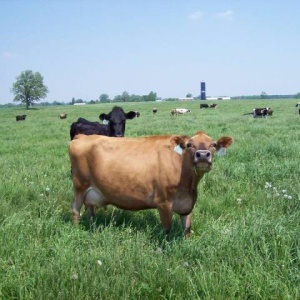
This article in Nature Climate Change argues that the global climate and agriculture research community needs to put increased emphasis on mixed crop-livestock farm systems and their interplay with climate adaptation and mitigation. Written by authors from CGIAR Research Program on Climate Change, Agriculture and Food Security (CCAFS) and the International Livestock Research Institute (ILRI), the piece outlines mixed farming systems' value to national development, climate adaptation and resilience building, farmers’ livelihoods and the globe’s food demand.
The paper points out that there has been very little research into how mixed crop livestock systems may be affected by climate change or how the system’s climate impacts can be mitigated and that this represents a critical knowledge gap, given the millions of people whose livelihoods depend upon such systems. It concludes as follows:
“The full adaptation potential of African smallholder mixed farming systems is not yet known, although from a technical standpoint, there is likely to be considerable scope for modifying these systems to improve the livelihoods of smallholder farmers, even in the face of climate change. Given the enormous population-fuelled pressures on land and natural resources that will be building up in the coming decades, this is a critical knowledge gap that deserves serious attention. There are considerable uncertainties concerning appropriate economic development pathways and consumption patterns for most of the agriculturally dependent countries of sub-Saharan Africa; but identifying those that balance national policy objectives with enhanced livelihoods and food security could be enormously beneficial for the hundreds of millions of people living in urban and rural settings. We need to improve our understanding of how African farming systems may change and adapt in response to global change, and how policy and governance frameworks can most effectively provide the enabling environment required.”
Abstract
Mixed crop–livestock systems are the backbone of African agriculture, providing food security and livelihood options for hundreds of millions of people. Much is known about the impacts of climate change on the crop enterprises in the mixed systems, and some, although less, on the livestock enterprises. The interactions between crops and livestock can be managed to contribute to environmentally sustainable intensification, diversification and risk management. There is relatively little information on how these interactions may be affected by changes in climate and climate variability. This is a serious gap, because these interactions may offer some buffering capacity to help smallholders adapt to climate change.
Citation
Thornton PK, Herrero M. 2015. Adapting to climate change in the mixed crop and livestock farming systems in sub-Saharan Africa. Nature Climate Change 5:830–836.
Read the full piece in Nature Climate Change (you will need subscription access) here.
You can do a website search for resources related to mixed crop and livestock systems. While recognising the papers’ arguments on the need to integrate perspectives, we have two separate Research Library categories on crop systems and livestock systems. See also Climate impacts on livestock.
For further coverage and summaries, see the three stories highlighted below:
Piece on CCAFS site: New Nature Climate Change perspective puts much needed focus on mixed crop-livestock farm systems in sub-Saharan Africa
Piece on ILRI site: Mixing it up—The information ‘black hole’ on crop+animal recipes for climate-smart and climate-resilient farms
Read Op-Ed by article author Philip Thornton on DEVEX: Why farms of the future need to mix livestock and crops







Post a new comment »